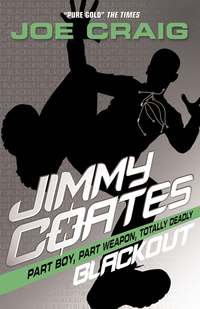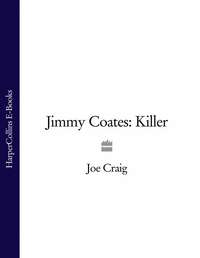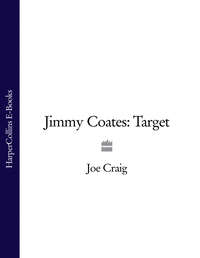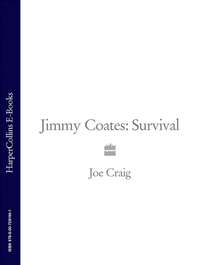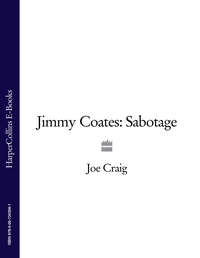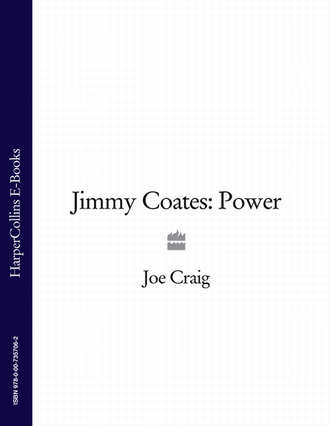
Полная версия
Jimmy Coates: Power
She even had the head concierge believing that she was sixteen, and the daughter of a foreign investor, on an undercover fact-finding mission. It was far-fetched but just about believable. Perhaps more so than the truth. Who would have believed that she was a genetically designed assassin working for the DGSE—the French Secret Service?
Zafi set about polishing the handrail on the main staircase, while she peeked down at the clock in the lobby. It was 4.50 a.m. In ten minutes she knew there would be a shift change and she knew exactly which team would be starting work. Memorising the rota had been one of the first steps in her assimilation on to the staff.
She left the gold of the handrail gleaming and trotted back up to the landing, where a service door took her into the Cavendish’s behind-the-scenes labyrinth. The twisting passages and spiral staircases of the ancient building were the perfect place to vanish.
This was just the first stage of Zafi’s disappearing act. From here, the whole world could become her labyrinth. Travel documents were easy to come by and easy to copy. Entire false identities could be created while inattentive receptionists took coffee breaks. The kitchens were a bountiful source of supplies and, thanks to the many empty bedrooms, she was well rested. The only question was where to go. Could she ever return to France? Her last mission for the DGSE had gone perfectly until the final moments. Instead of killing her targets, she’d helped them escape.
Zafi pattered through the corridors of the hotel, trying to picture the scenes back in Paris. Did her Secret Service bosses know yet that her targets were still alive? Could they possibly suspect that she’d failed on purpose? She was overcome by a rush of desperation. Would she ever get the chance to prove to them that she could be effective?
Her step was so light on the floorboards that there was hardly a creak. She made it to a storeroom of long-forgotten lost property and snatched up her jacket and a shoulder bag she’d packed full of essentials. In the pocket of her uniform she could feel the outline of her mobile phone, heavy on her skin. She knew the DGSE must have been trying to get in touch, but she didn’t dare check her messages.
Zafi slipped out of a fire escape into the back alley behind the hotel. Her timing was perfect. A rubbish truck rumbled into view at the end of the alley. The silhouettes of two burly refuse collectors lumbered towards the back door of the hotel. Zafi skipped past the pile of black plastic sacks and kept to the shadows. She easily slipped past the men without being noticed.
When she reached the truck, she pulled out her phone. It would be so easy to toss it away forever. Her old life would be over—crushed in the back of a rubbish truck. The DGSE would try to track her down, but they’d never find her. She was too good for that. She would let them assume she’d been killed in action by the British.
Her fist squeezed the phone so tightly it almost cracked the plastic casing. But she didn’t throw it. Her arm refused to move. She could feel her breath growing short and her limbs tightening. In seconds the rubbish men would be back and her chance would be gone. What was stopping her?
She glanced at the display on her phone. One new message. Her imagination dreaded what it might say. She’d failed to complete her mission. They could be recalling her to Paris to receive some kind of punishment. Or perhaps they were already laying a trap for her. Had she turned from France’s greatest weapon to an embarrassment, or even an enemy? Zafi gritted her teeth and told herself not to be so dramatic. It was just a mission, she thought. But without a mission, I’m nothing. In the corner of her eye she could see the rubbish collectors coming back, their backs laden with plastic sacks. Zafi pulled in a deep breath. I’m an assassin, she told herself. I can handle it. She delicately tapped the buttons on her phone and read the message.
As usual, it was in the form of an encrypted stream of letters and numbers. Zafi relished the warm hum in her brain, allowing her to read the code as simply as if it was a French nursery rhyme. When she saw what it said, the warmth spread from her head to the rest of her body. They obviously didn’t know what had happened—and they weren’t interested in the details. For now, at least, it looked like they trusted her. Zafi felt a surge of delight. They needed her. Something more pressing had come up and she was to turn her attention to it immediately.
At last Zafi smiled. This would be her chance. Who would care about the past if she completed this new mission? It would be the greatest achievement of any French assassin in history. It was the chance to prove she was still the best. To the DGSE and to herself.
She pulled off her maid’s uniform to reveal a thin black tracksuit underneath. She tossed the uniform into the rubbish truck, slipped the phone back into her pocket and set off at a jog. She headed south, towards Westminster. Her new target wouldn’t be hard to find.
She’d tried to eliminate him a couple of times before, but on each occasion somebody had been there to stop her. She’d tried to shoot him, but Jimmy Coates had got in the way. Then, more recently, she had intended to poison this target with the raw, untreated meat of a Greenland Shark. An NJ7 operative had ambushed her in Iceland and stopped her getting away with the poisonous meat.
This time Zafi knew she would succeed. She had to. For a short time she had let confusion get in the way of her identity. But she was back. And to prove it to everybody, only one man had to die. The five words of the message drummed through her head: “Terminate the British Prime Minister.”
Jimmy couldn’t believe that after an explosion like that on the track the train had continued its journey—and without the slightest delay. It was unusual for a train to be on time even without such a catastrophe on the line. He could only assume that NJ7 wanted to keep the little drama secret—as secret as an aerial fire fight and an explosion could be.
Even so, with every shift in the rhythm of the train’s rocking and every variation in the regular beat of the journey, Jimmy expected the worst. They’ll search the tunnel and the wreckage, he told himself. They’ll know I’m alive and that I’m on this train.
He had found a corner at the end of a carriage where he could sit without being observed. After he’d climbed in through the window he’d found a book that had fallen from one of the baggage racks and now he was leaning against the door to the toilet, pretending to read.
He didn’t even see the words on the page. He couldn’t settle his eyes on one thing for more than half a second. Nothing in his surroundings changed. Nobody came for him. Yet he couldn’t stop his nerves clattering as hard as the train. The cold from the floor crept through his body. He could feel heat spreading from his stomach and knew that his programming was trying to warm him and settle his nerves at the same time, but he fought it.
They’re trying to kill me, he told himself. It’s right to be on edge. The last thing Jimmy wanted to do was relax. He wasn’t ready to. His imagination was still replaying the explosion over and over, and his ears were still ringing from the successive booms. Most of all, he could still feel a rage inside him that was bursting to be let out.
At first he thought he was angry at the people who’d tried to blow him up, but slowly he realised that wasn’t true. The faceless pilots meant nothing to him, even when they aimed their rockets and pulled the trigger. Jimmy’s anger was for their boss. Not just the British Government, but one man. The new Prime Minister. The man who had given the Secret Service greater powers than ever before. The man who had fuelled public fear and hatred of the French to strengthen his own position. The man who had forced Neo-democracy even deeper into the British system and removed any chance that people might have to vote. The man who had once been Jimmy’s father—Ian Coates.
Jimmy had to put his book down and hold his head. He’d never felt such confusion. It was like madness. His hands were shaking violently and he knew now that he had to give in to that inner wash of calm. It dampened all of his emotions, blunting their bite. He concentrated on that inner cloud, cursing himself for resisting his programming. If he was to stay alive, he had to stay focused. And that meant not thinking about his father.
Over the past few weeks Jimmy thought he’d learned when to listen to his programming—he’d even been able to control it at times. But it was changing so fast, and it felt like the human in him was changing too. The lines weren’t so clear any more. Nothing was clear. He closed his eyes and let his lungs slow his breathing, despite the smell of the nearby toilet. He thought back to all the times when this strange force swelling inside him had saved him, trying to forget that without it he wouldn’t have been in trouble in the first place.
But for tonight’s crisis, he blamed himself. Why had he hesitated to escape from that newsroom when he knew the police were so close? He’d been stupid to even think that there might be news of his family there. Why would a local newspaper in the south of England have any interest in reporting the fates of three insignificant Londoners? That’s even if they’d been allowed to without censorship.
The last Jimmy had heard, his mum, sister and best friend had been in the custody of NJ7. Then the French Secret Service had sent an assassin to kill them, to punish Jimmy when a deal had gone bad. He had no idea what had happened to them after that.
For all Jimmy knew he was completely alone in the world. Right now, the power in his blood was the only ally he had. It could remove the pain of loneliness. It could remove his father from his mind completely. It’s on my side, he told himself. It’s me. But at the same he shuddered with terror. If this power inside was him, he was more killer than human.
03 THE WALNUT TREE PROJECT
Mitchell Glenthorne shifted uncomfortably in his seat and his knee twitched under the table. The eyes of everybody in the room seemed to burn into him. He wasn’t used to the scrutiny of the most powerful people in the country.
Around the long, lozenge-shaped table were the dozen men and women who could do almost anything they wanted with Great Britain. Thanks to Neo-democracy, they didn’t need to worry about the opinions of the British people. They could get on with the efficient day-to-day running of the country, much of which was done from here, the Cabinet Room at Number 10 Downing Street.
But however powerful these people were, they were under the control of a single man—Ian Coates, the Prime Minister. He was sitting at the centre of the table, leaning on his elbows with his shirtsleeves rolled up. Directly behind his head was one of Downing Street’s old portraits. Mitchell didn’t know who it was, but he recognised the new flag just above—a Union Jack, with an extra green stripe running down the centre. That green stripe was the emblem of NJ7.
“Ladies and gentlemen,” Ian Coates announced, “this is Britain’s finest asset.” It took a second for Mitchell to realise they were still talking about him. “A miracle of British science and genetic engineering.” The PM’s voice was low and stern. Mitchell wondered whether he spoke quietly on purpose, so that people had to crane their necks and listen closely for every word. He certainly wasn’t a charismatic speaker. Usually his imposing physical presence was enough— broad shoulders, thick brown hair and a heavy brow. But today Mitchell noticed the dark bags under his eyes and skin so pale it was almost yellow.
“He’s only thirteen years old,” the PM continued, “but Mitchell’s recent heroism has made Britain stronger, and shown us true British success.”
British success? When Mitchell thought back over his missions, all he could remember was the empty ache of failure. He wondered whether that was what the PM meant by “British success”.
“Learn from him.” The Prime Minister tapped his pen on the table and drew in a deep breath. “I invited him to this meeting because he’s an example to everybody.” Mitchell thought he saw a glimmer of emotion in Ian Coates’ bloodshot eyes. It quickly passed. Could the man have been thinking of his son, Mitchell wondered? Nobody was allowed to mention the fact that for eleven years Ian and Jimmy Coates had lived happily as part of the same family.
“Now we need people like Mitchell more than ever,” the PM declared. “We have a new danger.”
Let me out of here, Mitchell screamed silently. He longed for a mission, or at least to get back to his simple, disciplined and anonymous life in the underground bunkers of NJ7. It was almost as if the sunlight filtering through the lace curtains carried poison into his skin.
At last the Prime Minister took his eyes off Mitchell. “I’ve asked William Lee to brief you all,” he announced, with a dismissive wave towards the man on Mitchell’s right.
“Thank you, Prime Minister.” Slowly, the man stood up —and up and up. He was by far the tallest man anybody in the room had ever seen. Mitchell had started to get used to it over the last few days, but clearly several members of the Cabinet were overwhelmed. William Lee towered above them, his shadow running the entire length of the tabletop. Mitchell would have described the man’s face as Indian, but he knew that didn’t quite capture the unique character of his features: long, thin nose; eyes like black olives.
“Jimmy Coates is alive,” Lee began. “He’s in Britain and he’s spreading misinformation about the Government. Miss Bennett, the file.” He turned and looked down at the person on Mitchell’s left: the Head of NJ7, the most frightening and beautiful woman Mitchell had ever known. He was barely able to gather the courage to turn and look at her now.
She nodded to Lee with a delicate smile and tossed a manila folder into the centre of the table. Its contents spilled across the lacquer— printouts of web pages, stills of Jimmy’s video message, photos of the break-in at the newspaper office in Hailsham, along with reams of other documents and reports.
Mitchell’s eyes remained on Miss Bennett. Apart from Mitchell, she was the youngest person in the room. Mitchell guessed she must have been in her late thirties, but with such glowing skin and bright red lipstick she often seemed younger. She looked as she always did—her back straight, her mouth in a knowing half-smile, her chestnut hair pulled back tightly and held in place by a green clip. Yet Mitchell was suspicious. She wouldn’t normally have co-operated so readily with William Lee. Mitchell wondered whether at that very moment her assistants were delving into Lee’s past in another effort to undermine his position.
Technically, William Lee was nothing more than Director of Special Security for the Prime Minister, but he had quickly won Coates’ trust and established himself at the heart of the Government. When he spoke, he had all the authority of a world leader.
“Lies spread fast,” he said. “We’re following protocol, which means Miss Bennett has an NJ7 team working with the Corporation as we speak, to shut down any websites that carry his messages and limit the damage. But these lies seem to be spreading more quickly than any we’ve encountered from any opposition before. We traced the initial breach of information security to the office of a local newspaper in Hailsham. The editor and staff are in custody. They’re sharing what they know.”
Mitchell couldn’t help shuddering. He didn’t need to see the pictures in the manila folder. He knew what Lee meant by “sharing what they know”. He’d seen the stale bloodstains on the floors of NJ7 interview rooms.
Suddenly Lee was interrupted by a heavy sigh from Miss Bennett. Everybody looked to her.
“Sorry to interrupt,” she said, in a way that made it obvious she wasn’t sorry at all. “But shouldn’t you tell everybody exactly what this boy’s saying that’s so dangerous?”
Lee responded calmly. “Fine. He’s saying that the Government’s reasons for going to war with France are based on a lie. He claims we weren’t attacked by the French.”
“And were we?” Miss Bennett’s smile broadened, but her eyes glinted like blades.
“Were we what?”
“Were we attacked by the French? Or were we wrong?”
“Wrong?” Lee snapped. “The evidence was presented, discussed and agreed upon. You were there, and you agreed with the Prime Minister’s decision.”
“I agreed on the basis of the evidence,” Miss Bennett replied. “If it turns out that evidence was misleading, and we have new evidence…”
“The decision to attack France has already been taken,” Lee interrupted, “and now we must follow through.”
Mitchell tried to shrink into his chair. He was stuck in the middle of the argument. Even though he was secretly delighted that Miss Bennett knew exactly how to infuriate William Lee, he hated having the eyes of the room aimed in his direction again. In desperation he looked to the Prime Minister, hoping he’d put a stop to the discussion. But Coates was staring into the middle distance, his head swaying slightly from side to side. Was he OK, Mitchell wondered?”
“Tell me,” Miss Bennett was saying, “have you considered why Jimmy Coates’s message is spreading more quickly than anti-Government messages have in the past?”
Lee wasn’t phased by the question. “I’m sure your team at the Information Division knows much more than I could about which messages people choose to disperse over the Internet.” He let out an awkward chuckle. “It seems to me that people will forward any old rubbish. They send all their friends personality quizzes, ridiculous jokes and pictures of monkeys dressed as penguins.”
“I haven’t seen that picture,” Miss Bennett cut in. “I think I’d like to. Mitchell, make sure I see the penguin-monkey that Mr Lee knows so much about. I don’t want to be left behind.” Mitchell squirmed. “And find out about ‘jokes’ as well. I might like them.”
“Miss Bennett!” William Lee couldn’t help raising his voice now, and looked around the room for support. Mitchell knew that only the Prime Minister would have dared tell Miss Bennett to be quiet and right now he looked far away, concentrating on something else.
“No need to shout,” purred Miss Bennett. “All I’m saying is that it looks like people are responding to the boy’s message. Maybe they believe him, and maybe they want to believe him.”
Mitchell was amazed. He’d seen Miss Bennett argue with William Lee before, but never in front of so many other people.
“A message doesn’t spread itself, does it?” she went on. “It takes members of the public to—”
“Members of the public?” roared Ian Coates, suddenly bursting into life as if he’d just woken up from a nightmare. Everybody was startled. “Since when did we take the advice of strangers in the street on how to run the country?”
Mitchell watched the faces of Miss Bennett and William Lee. They were both dumbfounded by Ian Coates’ outburst. But as the PM went on, Mitchell noticed a change in his voice. It was thin and frail, like the voice of a man thirty years older.
“Members of the public?!” Coates repeated, even more indignant. “The system of Neo-democracy protects the British people from the ignorance of the general population.” His eyes bulged with rage and his temples were throbbing. Mitchell found he couldn’t look away from the beads of sweat glistening in the furrows on the man’s forehead. “The vital decisions are taken by experts,” Coates was saying. “By us. Nobody in Britain should live with the responsibility that they might have to make decisions of national importance. The consequences of such decisions are immense.”
Around the table, the Cabinet members were either staring into their laps or shooting each other glances of concern at the Prime Minister’s outburst. But nobody dared interrupt him.
“It is more vital than ever,” he went on, “that the country is fully behind this Government. The war with France is a vital part of that process. It’s the perfect way to unite everybody in Britain. And we’ll be united behind Neo-democracy.” He fixed his glare on William Lee. “That’s why we’ve come up with the Walnut Tree Project.” With another curt wave, he indicated that Lee should continue the briefing.
“Quite simply,” Lee explained, still rattled by the PM’s rant, “we have planned a new French attack. Not a strike on an oil rig or military target, but an attack on the British people themselves. This will be the best reminder to everybody in the country that we have a common enemy.”
“You’re going to attack British citizens yourself and then blame the French?” Miss Bennett wasn’t aghast, as Mitchell expected her to be. She sounded like she was calmly clarifying the details.
“We’ll try to minimise casualties, of course,” Lee replied. “But for the attack to look genuine, some members of society may have to be sacrificed.”
“Expendable ones,” Coates explained. “Criminals the courts haven’t convicted yet, homeless people, the unemployable…”
“I’ve chosen the most suitable site I could find on such short notice,” said William Lee. He picked up a large roll of paper from the floor and unfurled it on the table. It was a map of London. “In order to have the most impact, I realised that it had to be somewhere in London. And then I thought—why not use this to solve our other little problem?”
Everybody looked puzzled. Mitchell already suspected what Lee had in mind before he explained, “Jimmy Coates escaped our aerial task force. The strike on his helicopter was a success, but it turns out Jimmy wasn’t in it.”
Sounds like a British success, Mitchell thought to himself.
“Our investigative team now believes he could only have slipped away on the train. The train reached London twenty minutes ago, making it too late to seal Waterloo Station. But if we stage the attack carefully, in the vicinity of Waterloo, and we clear the area of police and ordinary security services, we might be able to tempt Jimmy Coates out of hiding to try to stop the explosion. We’ll make sure he doesn’t succeed, of course. At the very least, we may be able to pick up his trail. With any luck we’ll blow him up along with the building.”
Finally, Lee leaned forward, his shadow extending over the map of London like night falling across the city. He extended an elegant index finger and tapped a small lane called Walnut Tree Walk in Lambeth. All he said was, “A tower block.”
Everybody craned forward to get a look at the exact spot. The people at the far end of the table had to stand up to see and a general murmur broke out. Mitchell waited for someone to make an objection, but from the fear on their faces it was obvious nobody was going to. He wondered whether he should protest himself, but when he took a breath to speak it seemed to freeze his throat. He looked again at the map. The lines swirled around with the confusion in his head. He didn’t understand the politics of it, but he understood that the Government was going to blow up its own people just so they could blame the French.
“It’s for the greater good,” Lee whispered, resting a hand on Mitchell’s shoulder. Mitchell quickly nodded and made his face go blank. It wasn’t his job to react to Government decisions. He was lucky to even be at this meeting.
“Prime Minister.”
A firm voice broke through the hubbub. It was Miss Bennett. Her icy tone forced everybody back into their seats and commanded their attention. “Clearly you won’t be dissuaded from this ridiculous plot, and I can see the logic in it, but I must urge you not to rush into this. A disaster like this will certainly pull the country together and distract people from Internet rumours, but it does seem a little…clumsy.”
“Clumsy?” barked Coates.
“Yes. Like sending a torpedo to kill a mosquito.”
“It would do the job,” mumbled William Lee.
“It would also do the job to give an NJ7 team a little more time to shut down or reframe the necessary websites and spread counter-information. Meanwhile we’ll continue to hunt Jimmy Coates. We know he’s in London. There isn’t a square millimetre of the city that’s not covered by cameras or real-time satellite imaging—or both. We’ll find him and kill him by the end of the day.”


